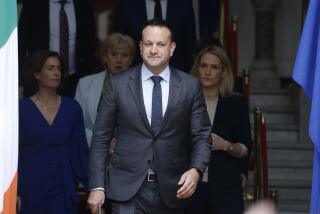Thatcher to Give Up Seat in House of Commons
- Share via
LONDON — Former Prime Minister Margaret Thatcher announced Friday that she will not run again for her seat in the House of Commons, thus putting an effective end to her long and distinguished political career.
She could still serve in the House of Lords, but, by her decision, she stepped out of the running as a future leader of the Conservative Party and as prime minister.
Thatcher’s action also removed from her successor, Prime Minister John Major, the discomfort of assertions by the opposition Labor Party that Thatcher was functioning as a back-seat driver, looking over Major’s shoulder from the back benches of the House of Commons.
The end to a career of more than 30 years in elected office was announced in an official statement by the 65-year-old Thatcher, who was forced to resign as prime minister last November after she failed to win the necessary backing in a vote among Tory members of Parliament for the post of party leader.
The announcement was welcomed by her friends, who believe her decision will give her more freedom to speak out on various issues than she now has as a serving member of the House of Commons.
Her statement said: “After deepest consideration I have decided not to stand again at the next election. I shall remain active in the House of Commons until the next election and thereafter in the political life of the nation, albeit in a different capacity.
“I shall always keep a close association with the people of Finchley (her north London constituency). I shall maintain a very great interest in economic affairs and international affairs which have such a great effect on the well-being of people everywhere.”
She also threw cold water on any notion that she may have become disillusioned with her successor as head of government by declaring: “It is my purpose to continue to be a strong ally and friend to Prime Minister Major and the government he leads.”
In response, Major, who is attending a summit meeting of European Community leaders in Luxembourg, said: “She will undoubtedly go down in history as one of the great prime ministers. The House of Commons will be the poorer for her absence.”
Thatcher was asked if she wants to go into the House of Lords, and she replied: “That is not entirely a matter for me, but I should very much like to.”
Thatcher is considered certain to gain a peerage, possibly as a baroness but more likely two notches higher as a countess, the traditional level for former prime ministers in Britain. The Queen names members of the House of Lords on the recommendation of the prime minister.
Speaking of her decision, Thatcher said: “I think making this decision now, as far as national politics is concerned, makes it quite clear that unlike what some people are saying, I have no desire or intention of going back to No. 10 (Downing Street--the prime minister’s official residence). It will make it easier for Prime Minister Major and it will make it easier for me to say exactly what I think without people misinterpreting what I say.”
Thatcher’s reservations about Britain’s membership in a tighter political union within the European Community are well known. But after she retires from Commons, her views are likely to have less impact on fellow Conservative Party stalwarts.
Thatcher was elected to three consecutive terms as Tory party leader until she was told by some of her party colleagues that she was in danger of losing a leadership election. That prompted her decision to step down as prime minister.
More to Read
Sign up for Essential California
The most important California stories and recommendations in your inbox every morning.
You may occasionally receive promotional content from the Los Angeles Times.













